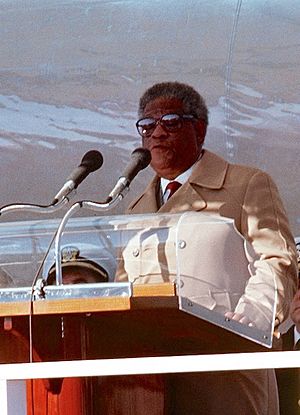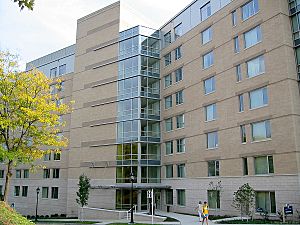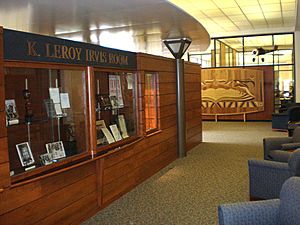K. Leroy Irvis facts for kids
Quick facts for kids
Kirkland Leroy Irvis
|
|
|---|---|

K. Leroy Irvis, speaker of the Pennsylvania House of Representatives, delivers a speech.
|
|
| 79th Speaker of the Pennsylvania House of Representatives | |
| In office May 23, 1977 – January 2, 1979 |
|
| Preceded by | Herbert Fineman |
| Succeeded by | Jack Seltzer |
| In office January 4, 1983 – November 30, 1988 |
|
| Preceded by | Matt Ryan |
| Succeeded by | James Manderino |
| Member of the Pennsylvania House of Representatives from the 19th district |
|
| In office January 7, 1969 – November 30, 1988 |
|
| Preceded by | District created |
| Succeeded by | William Russell Robinson |
| Member of the Pennsylvania House of Representatives from the Allegheny County district |
|
| In office January 6, 1959 – November 30, 1968 |
|
| Personal details | |
| Born | December 27, 1919 Saugerties, New York |
| Died | March 16, 2006 (aged 86) Pittsburgh, Pennsylvania |
| Political party | Democratic |
| Spouses | Katharyne Jones, Cathryn L. Edwards |
| Profession | Politician |
Kirkland Leroy Irvis (December 27, 1919 – March 16, 2006) was an important teacher, activist, and politician from Pennsylvania. He made history as the first African American to serve as a speaker of the house in any state legislature in the United States since the Reconstruction era. (Before him, John Roy Lynch of Mississippi was the first African American to hold this role.) Irvis was a Democrat. He represented the city of Pittsburgh in the Pennsylvania House of Representatives for many years, from 1958 to 1988.
Contents
Early Life and Education
Kirkland Leroy Irvis was born in 1919 in Saugerties, New York. His parents were Francis H. and Harriet Irvis. He went to local schools and was a very good student.
In 1938, he graduated with top honors from the University of New York State Teachers College (now called State University of New York at Albany). He earned a master's degree in education. He was only the second Black American to graduate from that college. During his studies, Irvis collected African American folklore, which was praised by his professor, Harold W. Thompson.
After college, Irvis moved to Baltimore, Maryland. He taught English and history in high schools there until World War II. During the war, he worked for the War Department as a civilian flying instructor.
Career in Pennsylvania
After World War II, Irvis moved to Pittsburgh, Pennsylvania. He worked for the local Urban League as a public relations secretary. In 1947, he led a protest against unfair hiring practices (called Jim Crow employment discrimination) at Pittsburgh's department stores. This was a very early protest of its kind in American history.
For a while, Irvis tried being an entrepreneur. He managed a toy factory and a hot dog stand. In 1950, he decided to change paths. He worked in steel mills and road construction to save money for law school.
Becoming a Lawyer and Politician
In 1954, Irvis earned his law degree from the University of Pittsburgh School of Law. He then worked for Judge Anne X. Alpern. Later, he became the city solicitor for Pittsburgh. He also became the first Black assistant district attorney for Allegheny County, Pennsylvania. To earn extra money, he worked as a radio announcer for WILY. As his reputation grew, he opened his own law practice.
Irvis entered politics and was elected as a state representative for Pittsburgh's Hill District. He served in the legislature for 15 terms, which is a very long time!
Key Achievements in the Legislature
As a representative, Irvis sponsored more than 1600 bills. He is best known for laws that helped with:
- Civil rights and fair housing
- Education and public health
- Highway safety
- Modernizing the penal code (laws about crime and punishment)
In 1972, Irvis was involved in a court case called Moose Lodge No. 107 v. Irvis. This happened after a private club refused to serve him because of his race. The U.S. Supreme Court allowed the club to make its own rules. However, within a year, the Moose International Inc. organization ended its racial discrimination policy.
In 1977, all the representatives voted for him to become the speaker of the house. This was a huge honor and a historic moment.
His most important achievements include helping to create:
- The Pennsylvania Human Relations Commission (which works against discrimination)
- The Pennsylvania Higher Education Assistance Agency and Equal Opportunity Program (helping students get an education)
- Pennsylvania's community college system
- The Minority Business Development Authority (supporting minority-owned businesses)
- The Pennsylvania Council on the Arts (supporting arts and culture)
He also played a big role in creating the Pennsylvania House Ethics Committee, rules for lobbyists, and the Legislative Audit Advisory Commission.
Later Life and Legacy
In 1988, Irvis retired from politics. That same year, he published a book of his poems called This Land of Fire. He also enjoyed making wood sculptures. His sculptures were shown in art exhibits across the country.
Kirkland Leroy Irvis passed away at age 86 from cancer.
Honors and Recognition

Many groups have honored Irvis for his work. These include the NAACP, University of Pennsylvania, Lincoln University of Pennsylvania, and Dominion Resources. The University of Pittsburgh has a special K. Leroy Irvis Reading Room in its Hillman Library.
In 2003, a building in the Pennsylvania Capitol Complex was renamed the Speaker K. Leroy Irvis Office Building. On March 25, 2013, the Community College of Allegheny County opened the K. Leroy Irvis Science Center. It was named after him because he helped create the community college system in Pennsylvania.
In 2017, the University of Pittsburgh renamed one of its student dorms, Pennsylvania Hall, to K. Leroy Irvis Hall.
Pennsylvania Democratic Party Chairman T. J. Rooney called Irvis "one of the greatest legislative giants" and "one of the most admired and respected Pennsylvanians we'll ever know."
Personal Life
Irvis married Katharyne Jones, and they had two children, a son named Reginald and a daughter named Sherri. Katharyne passed away in 1958. In 1973, Irvis married Cathryn L. Edwards, who survived him. His grown children also survived him.
Irvis was a Catholic.
The K. Leroy Irvis Papers

The University of Pittsburgh Library System has a large collection of materials about Irvis's life and political work. This collection is called the K. Leroy Irvis papers. It includes:
- Letters and messages
- Materials about laws he worked on
- Interviews he gave
- Photographs
- Publications
- Information from his political campaigns
Some interesting parts of the collection include:
- Details about his life story
- Information about the Camp Hill Prison Riots from 1989-1990
- Materials about his hobbies, like model airplanes, music, crafts, and wood sculpting
- Documents about Pennsylvania history
- Records of his awards, degrees, and honors
See also
- Speaker of the Pennsylvania House of Representatives
 | James Van Der Zee |
 | Alma Thomas |
 | Ellis Wilson |
 | Margaret Taylor-Burroughs |

